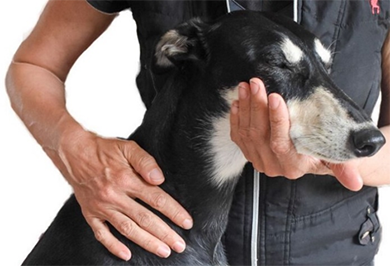Select tab
About
This Lantra-accredited Customised Award is exclusively developed and delivered by a Lantra-approved Training Provider, who meets our quality standards. The course is specifically tailored to meet learners’ needs. For further details about the course content and delivery locations, please contact the Training Provider using the details provided below.
The minimum age to undertake this course is 18.
The course is completed through a mixture of home study and practical days.
Students have 4 home study blocks to complete, where they will learn 10 key canine anatomy and physiology systems, the fundamentals of complementary therapies and the theory of the therapy process – from veterinary approval through to the therapy session and giving aftercare advise. Students will also learn relevant business development skills.
Students will learn over 30 individual therapy techniques encompassing deep tissue massage, joint mobilising techniques, limb stretches, Light Touch Release (LTR) and soft tissue rolling developed specifically for the your4legs courses.
The therapy process, including gait and static assessment, will be practised during 12 intense hands on tutored practical days. The practical days will also include key lectures relating to the therapy process, the musculoskeletal system, common illnesses, conditions and injuries, veterinary diagnosis and an introduction to canine rehabilitation including the use of physiotherapeutic equipment.
The finer details
At your4legs our aim is to enable as many animals as possible to feel the benefits of good therapy work.
In addition to the health benefits of massage, your4legs students will also learn a range of joint mobilising techniques and additional therapy methods developed specifically for the your4legs courses. These include soft tissue rolling and Light Touch Release (LTR), which are related to trigger points and fascia release. Students will also gain a good introduction to canine rehabilitation to help further with the healing process.
The course includes 4 home study theory blocks and 12 intense hands-on practical days.
The course pack includes a comprehensive textbook designed specifically for the course by the your4legs team, together with a workbook which contains questions related to each home study block. The questions need to be completed by the student as part of their home study and marks will count towards their final theory mark.
Students need to complete a range of case studies and a small project on a subject of their choice that is related to canine therapy.
There is a final written exam and a practical assessment. The practical is marked by an external assessor to ensure consistency of quality.
The home study blocks are designed to give students the necessary understanding of 10 key anatomy systems including the musculoskeletal system, the fundamentals of therapy and the theory of the therapy process – from veterinary approval through static and gait assessment to the therapy session and giving relevant aftercare advise. Students will learn key illnesses, injuries and conditions related to both activity and breed type and will gain an introduction to the theory of rehabilitation including some practical techniques and the use of physiotherapeutic equipment. Students will also learn the key aspects of building their own business.
The 12 hands-on practical days include a range of lectures to enhance the learning from the home study blocks with specific lectures related to gait and static assessments, the musculoskeletal and nervous system and a practical introduction to canine rehabilitation.

Recognised by
Accredited AIM Assessments & Qualifications (who are regulated by Ofqual). Recognised by the IAAT (International Association of Animal Therapies) as acceptable for student / practitioner membership of the IAATCourse description:
Who should attend?
Those who are already qualified as therapists and wish to learn additional therapy skills
Adults looking for a career change
Veterinary professionals – vets and vet nurses
Those already working within the canine industry and wishing to broaden their skills and add to their passion – for example behaviourists, trainers, dog groomers and breeders
What will be covered?
At your4legs our key aim is to enable as many animals as possible to feel the benefits of good therapy work. Therefore, the key objectives of this course are to ensure that students gain the necessary theory knowledge and practical skills to become competent and professional canine massage therapists, enabling students to turn their passion into a career.
During the course the following key areas will be covered:
- X10 canine anatomy and physiology systems
- The therapy process – from veterinary approval through to aftercare advise.
- Gait and static assessment and understanding lameness
- Key illnesses, injuries and conditions specific to breed type and activity
- Deep tissue massage techniques
- Adapting massage techniques to warm up and activate muscles prior to activity
- Adapting massage techniques to cool down muscles and help remove toxins after activity
- Soft tissue rolling (Designed by your4legs during extensive practise and results over more than 10 years of therapy work)
- Light Touch Release (LTR) Techniques (Designed by your4legs)
- Working the bladder meridian
- Limb stretches and range of motion related to canine rehabilitation
- Joint mobilisation techniques
- The use of physiotherapeutic equipment
- Health and safety around dogs and correct technique application to look after yourself as a therapist for the long term
- Understanding and establishing trust with the dog
- Legal practice - complying with the Veterinary Act 1966 and Exemptions Order 2015
- Support with Veterinary report writing, and aftercare advise plans
- Managing the clients’ expectations and Communication with the veterinary community
- Developing a new business
Search for providers near you
If there are no suitable courses listed above, please fill in the details below and this will display a list of other course providers who also deliver this course.


